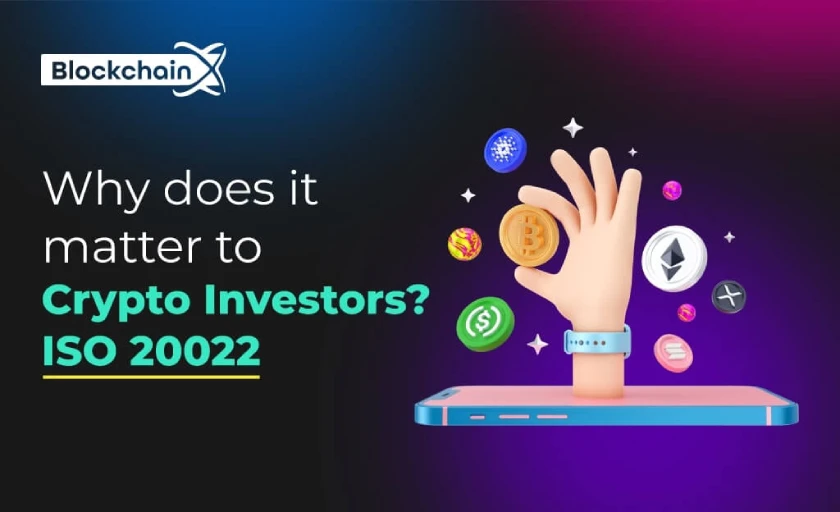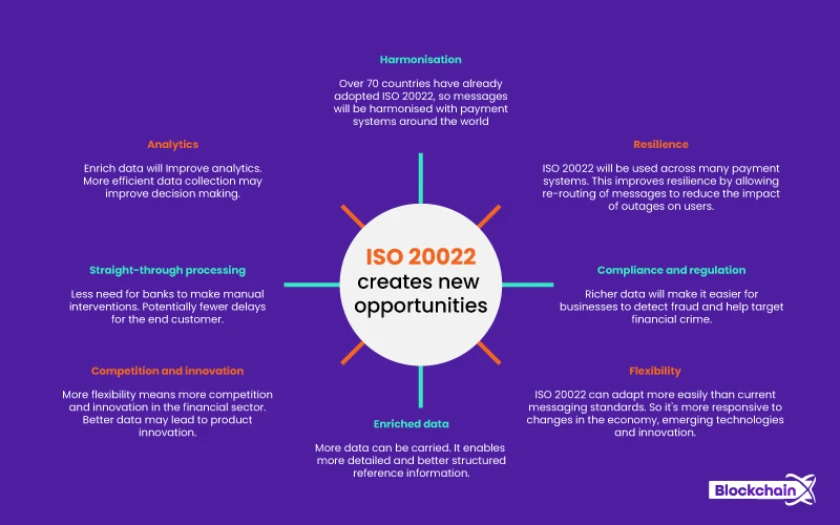
What Is ISO 20022 : How Will This New Data Standard Impact Your Crypto Industry?
The COVID-19 pandemic changed many aspects of our lives, including how we shop and with that, transactions over digital platforms skyrocketed beyond what anyone could have imagined, so much so that the majority of these transactions were delayed because the banks couldn't handle the increased numbers. This is where ISO 20022 comes in.
In reality, ISO 20022 adoption has been a 15-year journey.The best part is that this new system now allows for the use of cryptocurrencies.
Doesn't that sound impressive? Hold on! Do you even know what ISO 20022 is? Or how may this new technology affect the cryptocurrency world? No? Okay! You've arrived at the right place.
This blog will explain the meaning of ISO 20022 and the cryptos used in this network. More importantly, we will go over more relevant information about this topic. So buckle up as we ride into the future of cryptocurrencies.
What Is ISO 20022?
ISO 20022 is a messaging format that allows adopters to define tags and data through messages.Through this system, the current payment message limit of 100 characters will be increased to around 9000 characters. With this increase, messages will provide information on business processes, payment roles, and business activities to the parties involved. Data is now considered the new form of currency. Data standards typically help to govern what type of data is collected, how the data is structured, and what the data means. In essence, when these data standards are widely adopted, they play a critical role in assisting users in achieving a higher level of automation and much more.
That is precisely what ISO 20022 is intended to accomplish. This system will increase transaction speed and efficiency. Furthermore, banks and financial institutions that currently use SWIFT as a messaging system have been requested to adopt ISO 20022. That's correct! Furthermore, by 2025, ISO 20022 will be the global standard for all banking systems.
Benefits of ISO 20022
End-to-end data transaction that runs smoothly
Data will be richer, better structured, and more granular through ISO 20022. This ensures an efficient end-to-end payment messaging system.
Payments for Excellence
Another major benefit of ISO 20022 is that it provides customers with more transparency and remittance information. This will result in a more positive customer experience and service. However, more customers will tend to be drawn toward these payment systems.
Better Analytics
This system also provides improved analytics while requiring less manual intervention. That means the system can run without any human intervention, increasing the process's accuracy. More importantly, ISO 20022 introduces high-level resilience and fraud-prevention measures.
Entire support
Once the adoption of ISO 20022 is complete, the entire financial market will use a single standard that covers all business domains and the end-to-end business process. Furthermore, ISO 20022 facilitates the creation of new services.
Modern Technology
This new network makes use of modern XML technology, so it is well supported and can integrate flawlessly with existing systems.
What Does ISO 20022 Have to Do With Crypto?
Cryptocurrencies are best described as decentralized. More importantly, cryptocurrencies are outside of government regulation. Therefore, investors can trade their assets in an untraceable manner. Even though this is an excellent feature of the crypto world, it is difficult to regulate. This is one of the most intense debates currently taking place. Because of the decentralization of cryptos, most investors are vulnerable to fraud and hacker attacks. Fortunately, these systems have a higher level of security that works in most cases, but we still need to improve security. That is why central banks and other financial institutions are trying to centralize the use of these cryptos in order to restore some sanity to the crypto world.
However, since cryptos were originally intended to be decentralized, ISO 20022 comes into play. Even so, if the Federal Reserve Banks agree to allow digital currencies, ISO 20022 is an excellent choice. Prices for ISO 20022-compatible cryptos are expected to rise once this technology is implemented. Overall, that is still future speculation. With that in mind, let us examine the impact of ISO 20022.
What impact will the global adoption of ISO 20022 have?
This widespread adoption of this type of financial messaging is expected to have a significant impact on financial institutions, corporations, and any business with a stake in financial services and the large value payments industry. ISO 20022 is the only way to go because it is the most comprehensive financial data standard currently in use.
Over 70 countries, including Switzerland, China, India, and Japan, have already implemented ISO 20022 in their payment systems. With over 200 payment types covered, ISO 20022 will harmonize formats and data components from previously incompatible payment methods. Domestic, high-value, and cross-border payments will all be subject to ISO 20022 . It creates many new opportunities for crypto investors

Which Cryptos Are Included in ISO 20022?
As we previously stated, cryptocurrencies will be included in the ISO 20022 system. The following cryptos are compatible with ISO 20022.
XRP
The basic concept behind XRP is to be the bridge between the crypto and fiat worlds. And there is no better way than to have an algorithm that integrates seamlessly with the new ISO 20022. Ripple is the founding company, and it has been working to achieve its goal of becoming the bridge currency. More importantly, XRP is what drives the RippleNet blockchain technology.Ripple has consistently advocated for the integration of the crypto and fiat worlds. so much so that they've formed alliances with various central banks to facilitate cross-border transactions. RippleNet currently relies on ISO 20022 standardization.
XLM
XLM is another crypto that can be easily integrated with ISO 20022. Stellar is an open-source blockchain that enables the exchange of digital representations of various currencies, including dollars, bitcoin, and pesos. This network performs all of the functions of a bank, but on the decentralized blockchain network. As a result, XLM will be part of this new shift.
ALGO
Algorand is a crypto network designed to address some of the crypto network's most significant challenges, such as speed, security, and decentralization. The proof-of-stake consensus protocol is used by Algorand to run its ALGO cryptocurrency. It's also one of the cryptos listed on the ISO 20022 network, indicating that this blockchain is ready for the next stage of the crypto world.
FLR
Flare is a distributed network with distinct characteristics that creates a two-bridge path between ETH and XRP. This bridge will allow users to buy items and use XRP on the well-known dApps platform. Moreover, the Spark token is the cryptocurrency designed to power the Flare network. Furthermore, FXRP represents XRP in the Flare network, allowing XRP holders to redeem and create smart contracts using this token. Besides which, since this Flare network employs XRP, it is compatible with the ISO 20022 system.
XDC
The XinFin (eXchange infinite) created the cryptocurrency known as XDC, which is built similarly to the Ethereum network. XDC uses Proof of Stake, allowing for instant block finality, hybrid relay bridges, and interoperability with ISO 20022. Typically, in the XDC decentralized network, XDC serves as a settlement item. Above all, XDC's interoperability with ISO 20022 makes it an important and valuable asset for the future of the crypto world.
IOTA
IOTA is last but not least. A decentralized ledger created specifically for use with Internet of Things transactions is the cryptocurrency blockchain. Additionally, this network aims to solve the crucial issues in the crypto space, such as the performance and scalability problems with Bitcoin, the reigning crypto king.The technical team of the network intends to accomplish this by replacing the blockchain with Tangle.The Tangle network is distinguished by the fact that each new transaction confirms the previous two.In addition, IOTA is compatible with the ISO 20022 system.
Take away
With many people believing that cryptocurrency is the future of money, the fusion of these systems could lead to an explosion in the popularity and use of cryptocurrencies between traditional and crypto-focused, decentralized financial entities.
It's too early to tell how this will impact the cryptocurrency market. In some ways, if ISO 20022 becomes too popular, it may reduce the market demand for crypto as a payment processing solution. As a result, investors should keep an eye on ISO 20022-compliant cryptos for potential price movements as well as whether existing (or brand new) cryptocurrencies and tokens begin to adopt this standard.





